1-Can Turkey sustain its economic miracle?
Turkey has impressed the world with its decade-long economic
boom. But many economists are raising doubts about the future and
suggest that Turkey cannot continue its growth pace with the current
model.
Despite the gloomy economic outlook in Europe, Turkey's economy
continues to grow rapidly, making the country an attractive destination
for foreign investments. Economic growth was close to 7.5 percent in
2011 and this year the Turkish government estimates the economy to
expand by a further 4 percent. Turkey's exports and imports continue to
rise, as another sign of strength of the world's 15th-largest and
Europe's 7th-largest economy. Turkey's sovereign debt has been reduced
to just 42 percent of its gross domestic product, one of the lowest
levels in Europe after Sweden and the Czech Republic.
Following all the recent positive developments, Moody's, one of the world's top three rating agencies, last week raised Turkey's national credit rate to Ba1, strengthening the country's position as an emerging financial power.
Turkish Economy Minister Zafer Caglayan said Moody's upgrade was "right, but not enough." He stressed that where Turkey once had been dependent on International Monetary Fund credits, it had now gained a stronger profile, becoming one of the creditors of the IMF and even recently pledging $5 billion (4 billion euros) to its crisis fund. Stressing that Turkey's budget gap - GDP ratio is smaller than most of the EU countries, Caglayan said the country deserved a higher rate, at the very least an "investment grade" level.
Not immune
Many analysts think the ruling Justice and Development Party's (AKP) economic policies have been a success story. But the Turkish economy is not immune to vulnerabilities stemming from rapid growth in recent years, or external factors, such as the financial crisis in Europe.
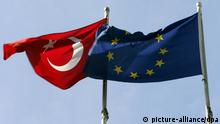 Most of Turkey's exports go to the EU
As Turkey's economy is highly dependent on Europe and the financial
crisis in the eurozone poses challenges to the country's economic
growth. Forty-six percent of Turkey's exports go to the EU and Europe
continues to be the main source of Foreign Direct Investement (FDI) to
Turkey, with a share of 76 percent. More than 75 percent of the
country's tourism comes from Europe.
Most of Turkey's exports go to the EU
As Turkey's economy is highly dependent on Europe and the financial
crisis in the eurozone poses challenges to the country's economic
growth. Forty-six percent of Turkey's exports go to the EU and Europe
continues to be the main source of Foreign Direct Investement (FDI) to
Turkey, with a share of 76 percent. More than 75 percent of the
country's tourism comes from Europe.
Turkey has enjoyed an impressive, decade-long economic boom, but the sustainability of this growth rate in the years ahead is questionable. When the AKP came to power in 2002, Turkey's GDP was 243 billion euros ($303 billion). It rose to 550 billion euro in 2010, while the country's exports increased from 41 billion euros in 2003 to 85 billion euros in 2010.
Many analysts view Turkey's current account deficit as a major source of concern for the future of the economy. This deficit stood at 10 percent of gross domestic product in 2011, one of the highest in the world. A major reason is the widening gap between Turkey's exports and imports.
Major concern
"Turkey's current account deficit is also a sign that Turkey is consuming more than it is saving," prominent Turkish economist and columnist of the Sabah daily, Suleyman Yasar said. "But this deficit is mainly from the private sector, not from the public sector. And it is not expected to become a major risk for the economy." Yasar stressed that a solution to the problem would not be taking measures to increase savings, but currency depreciation, thus strengthening Turkey's competitive power.
According to Mahfi Egilmez, an economist and former treasury undersecretary, the current account deficit has been an integral part of Turkish model of development. As Turkey's savings are at their lowest level in 20 years, the country is financing its investments through foreign financial sources. Turkey has traditionally been an import-dependent developing economy, but this model needs to be changed, according to Egilmez.
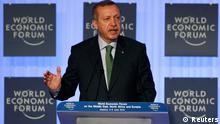 Experts say the government should not rest on its achievements
"It is not possible for Turkey to continue its decade-long economic
boom for another decade with the current model, which can be summarized
as more foreign deficit, more development," he wrote in his blog.
"Turkey should move toward a new model, with the motto of less
account-deficit, more domestic production, with an open foreign
competition," he stressed.
Experts say the government should not rest on its achievements
"It is not possible for Turkey to continue its decade-long economic
boom for another decade with the current model, which can be summarized
as more foreign deficit, more development," he wrote in his blog.
"Turkey should move toward a new model, with the motto of less
account-deficit, more domestic production, with an open foreign
competition," he stressed.
Real picture
Turkey's recent economic performance over the last couple of months is positive, according to Egilmez. According to statistics from the first quarter of 2012, Turkey's current account deficit decreased from $21.6 billion to $16.2 billion. Turkey's exports in the first 3 months increased to $37.6 billion, compared with the $33.2 bilion in the same period last year, while imports also showed a slight increase.
While many analysts are optimistic for the future of the Turkish economy, economists like Mustafa Sonmez caution against over-optimism. According to him, macro-economic statistics highlighted by the government as a success story only give a limited picture of the real situation of the Turkish economy. Statistics about GDP growth, exports, sovereign debt and current-account deficit are important, but not enough for a comprehensive understanding, he said. Turkey's pride about its economy should be based on facts, not illusions.
"When comparing Turkey with European economies, one also has to look at GDP measures regarding purchasing power parity," he stressed. "According to the average income of citizens, Turkey is still far behind the EU average. The average income of a Turkish citizen is almost half of the EU average," he wrote in his blog.
Missing this real picture is "just like being the frog in Aesop's Fables, who wants to be as big as the cow. He inflates himself again and again. But in the end, he bursts."
Author: Ayhan Simsek
Editor: Rob Mudge
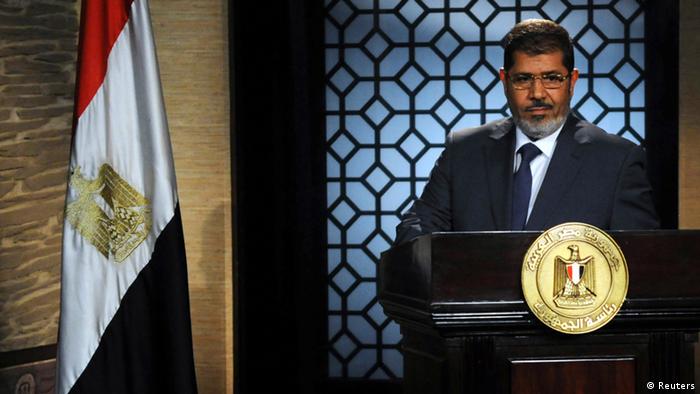
Following all the recent positive developments, Moody's, one of the world's top three rating agencies, last week raised Turkey's national credit rate to Ba1, strengthening the country's position as an emerging financial power.
Turkish Economy Minister Zafer Caglayan said Moody's upgrade was "right, but not enough." He stressed that where Turkey once had been dependent on International Monetary Fund credits, it had now gained a stronger profile, becoming one of the creditors of the IMF and even recently pledging $5 billion (4 billion euros) to its crisis fund. Stressing that Turkey's budget gap - GDP ratio is smaller than most of the EU countries, Caglayan said the country deserved a higher rate, at the very least an "investment grade" level.
Not immune
Many analysts think the ruling Justice and Development Party's (AKP) economic policies have been a success story. But the Turkish economy is not immune to vulnerabilities stemming from rapid growth in recent years, or external factors, such as the financial crisis in Europe.
 Most of Turkey's exports go to the EU
Most of Turkey's exports go to the EUTurkey has enjoyed an impressive, decade-long economic boom, but the sustainability of this growth rate in the years ahead is questionable. When the AKP came to power in 2002, Turkey's GDP was 243 billion euros ($303 billion). It rose to 550 billion euro in 2010, while the country's exports increased from 41 billion euros in 2003 to 85 billion euros in 2010.
Many analysts view Turkey's current account deficit as a major source of concern for the future of the economy. This deficit stood at 10 percent of gross domestic product in 2011, one of the highest in the world. A major reason is the widening gap between Turkey's exports and imports.
Major concern
"Turkey's current account deficit is also a sign that Turkey is consuming more than it is saving," prominent Turkish economist and columnist of the Sabah daily, Suleyman Yasar said. "But this deficit is mainly from the private sector, not from the public sector. And it is not expected to become a major risk for the economy." Yasar stressed that a solution to the problem would not be taking measures to increase savings, but currency depreciation, thus strengthening Turkey's competitive power.
According to Mahfi Egilmez, an economist and former treasury undersecretary, the current account deficit has been an integral part of Turkish model of development. As Turkey's savings are at their lowest level in 20 years, the country is financing its investments through foreign financial sources. Turkey has traditionally been an import-dependent developing economy, but this model needs to be changed, according to Egilmez.
 Experts say the government should not rest on its achievements
Experts say the government should not rest on its achievementsReal picture
Turkey's recent economic performance over the last couple of months is positive, according to Egilmez. According to statistics from the first quarter of 2012, Turkey's current account deficit decreased from $21.6 billion to $16.2 billion. Turkey's exports in the first 3 months increased to $37.6 billion, compared with the $33.2 bilion in the same period last year, while imports also showed a slight increase.
While many analysts are optimistic for the future of the Turkish economy, economists like Mustafa Sonmez caution against over-optimism. According to him, macro-economic statistics highlighted by the government as a success story only give a limited picture of the real situation of the Turkish economy. Statistics about GDP growth, exports, sovereign debt and current-account deficit are important, but not enough for a comprehensive understanding, he said. Turkey's pride about its economy should be based on facts, not illusions.
"When comparing Turkey with European economies, one also has to look at GDP measures regarding purchasing power parity," he stressed. "According to the average income of citizens, Turkey is still far behind the EU average. The average income of a Turkish citizen is almost half of the EU average," he wrote in his blog.
Missing this real picture is "just like being the frog in Aesop's Fables, who wants to be as big as the cow. He inflates himself again and again. But in the end, he bursts."
Author: Ayhan Simsek
Editor: Rob Mudge

An Iranian claim that just-elected Egyptian President Mohammed
Morsi is planning to move his country closer to the theocracy in Tehran
may have been a false alarm. But it showed just how jangly nerves are at
the moment.
Everyone with an interest in the Middle East was jolted by reports on
Monday that newly elected Egyptian President Mohammed Morsi had told
Iranian state radio he wanted closer ties to Iran and a revision of the
1979 Camp David Accords between Egypt and Israel.
The situation then took on an almost surreal quality as Morsi immediately denied not only making the statements, but also having given an interview at all to Iran's FARS network.
In the aftermath, even the experts are uncertain as to what, if indeed anything, really happened.
"No one can say from here right now whether any sort of interview took place or not, but it's interesting that such a claim is coming from an official Iranian institution," Sylke Tempel, a Middle East expert at German Society for Foreign Policy (DGAP) told DW. "It's also interesting that Morsi was so quick to deny that he'd given the interview or that he'd said he wanted closer relations with Iran."
Media in the West have tended to treat the interview as fictional. Still, the discussions surrounding it do give some real insight into how various parties - first and foremost Iran - may approach a democratic Egypt led by an Islamist president.
Iranian pipe dream?
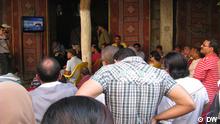 Morsi was the Muslim Brotherhood's candidate
Tempel points out that Iran Supreme Leader Ayatollah Khamanei was quick
to welcome the popular uprising that began a year and a half ago and
toppled the secular leader Hosni Mubarak.
Morsi was the Muslim Brotherhood's candidate
Tempel points out that Iran Supreme Leader Ayatollah Khamanei was quick
to welcome the popular uprising that began a year and a half ago and
toppled the secular leader Hosni Mubarak.
But she says the notion that the triumph of the Islamist Muslim Brotherhood will lead to a strong alliance between Sunni Egypt and Shiite Iran probably represents "wishful thinking."
"We know that there is a gulf between Shiites and Sunnis and that many within the Muslim Brotherhood are sceptical toward Iran," Tempel explained. "It's not as if the Muslim Brothers are all fans of Iran. So it seems a bit strange that one of the first things Morsi would say is that he wants better relations with Iran."
The story about Morsi's alleged statement got a lot of play in Russia, while being generally dismissed elsewhere outside of Iran. But it could also be seen as bit of internal Iranian propaganda.
"The state-run media in Iran is exactly that: state run," Tempel says. "It's in the interest of the Iranian government to depict the revolutions in the Arab world as pro-Iranian. They want to pretend there's no divide between Sunnis and Shiites. They want regional hegemony, and a pro-Iranian Egypt would be perfect for that aim. So it's not surprising to find reports like this in the Iranian media."
But regardless of its truth content, the Iranian report did create significant concern - a fact that reflects just how much of an open book Morsi is.
Unwelcome distractions
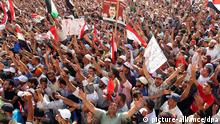 Demostrator at Cairo's Tahrir Square cheered when Morsi was declared the winner on June 24
Demostrator at Cairo's Tahrir Square cheered when Morsi was declared the winner on June 24
Morsi's background as a leading member of the Muslim Brotherhood with
its hostility to Zionism has made many countries, and particularly
Israel, nervous. But Morsi resigned from that organization when he was
elected, and experts say they don't expect any immediate drastic changes
in Egypt's foreign policy.
"I think we can take Morsi at his word when he says international treaties will be honored," Florian Kohstall, the director of the Free University of Berlin's Cairo office, told German broadcaster ARD. "The peace treaty with Israel will definitely be honored."
Jane Kinninmont, senior research fellow on the Middle East and North Africa at British think tank Chatham House, shares that assessment.
"I think it's overwhelmingly likely that no party that comes into power in Egypt is going to want to go back to a state of war," Kinninmont told AFP news agency, adding that Israel's main concern would likely be security in the Sinai area, a haven for both anti-Israel and anti-Egyptian-government militants.
Tempel concurs with that view, but adds that the uncertainty Morsi represents has given Israelis another issue to think about in a situation already fraught with worries.
"Israel's border with Egypt is about to become complicated, and it remains to be seen to what extent Morsi will insist upon the state's monopoly on force there," Tempel told DW. "For the Israelis, Iran is the paramount threat since their leaders have directly threatened to destroy Israel, and Israeli Prime Minister Benjamin Netanyahu is taking that threat seriously. Egypt represents an unwelcome further distraction."
Up in the air
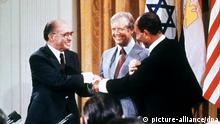 Morsi's pledge to honor past agreements should apply to the 1979 peace treaty with Israel
Morsi's pledge to honor past agreements should apply to the 1979 peace treaty with Israel
For years, observers in the West worried about what would happen if an
Islamist came to power in Egypt, where the government has usually been
far more accepting of Israel than the general populace.
Now that scenario has come to pass, even if Morsi has been speaking in relatively moderate tones and promising to uphold his country's previous agreements. Political Islamism is fact of life in democratic Egypt, and as Sylke Tempel points out, what long-term foreign policy ramifications it will bring simply cannot be foretold at the moment.
"We've yet to see a clear foreign policy direction from Morsi," Tempel said. "But after all he's only been in office for a day and a half."
And the circumstances under which Morsi came to power bring contraints that may push him in certain directions.
"You have to remember that the Islamist parties got 70 percent of the vote in the parliamentary elections, but in the first round of the presidential ones, there was only 24 or 25 percent for Mohammed Morsi," German journalist and Middle East expert Esther Saoub told DW on the eve of Morsi taking power.
"That means half of his votes came from people who didn't vote for him in the first round, and he has to keep these people," Saoub said. "If he disappoints them with overly conservative decisions, he will lose power."
Author: Jefferson Chase
Editor: Rob Mudge
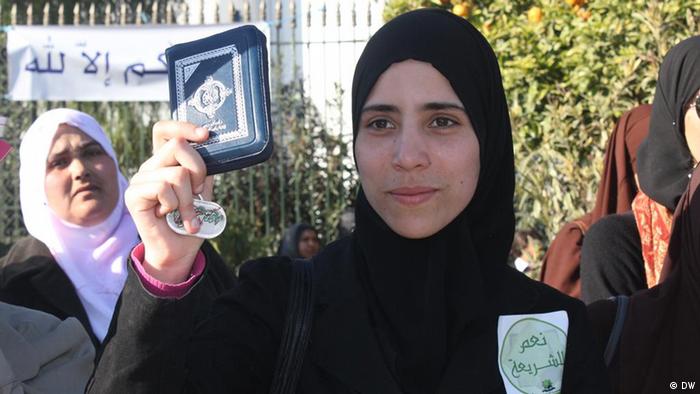
The situation then took on an almost surreal quality as Morsi immediately denied not only making the statements, but also having given an interview at all to Iran's FARS network.
In the aftermath, even the experts are uncertain as to what, if indeed anything, really happened.
"No one can say from here right now whether any sort of interview took place or not, but it's interesting that such a claim is coming from an official Iranian institution," Sylke Tempel, a Middle East expert at German Society for Foreign Policy (DGAP) told DW. "It's also interesting that Morsi was so quick to deny that he'd given the interview or that he'd said he wanted closer relations with Iran."
Media in the West have tended to treat the interview as fictional. Still, the discussions surrounding it do give some real insight into how various parties - first and foremost Iran - may approach a democratic Egypt led by an Islamist president.
Iranian pipe dream?
 Morsi was the Muslim Brotherhood's candidate
Morsi was the Muslim Brotherhood's candidateBut she says the notion that the triumph of the Islamist Muslim Brotherhood will lead to a strong alliance between Sunni Egypt and Shiite Iran probably represents "wishful thinking."
"We know that there is a gulf between Shiites and Sunnis and that many within the Muslim Brotherhood are sceptical toward Iran," Tempel explained. "It's not as if the Muslim Brothers are all fans of Iran. So it seems a bit strange that one of the first things Morsi would say is that he wants better relations with Iran."
The story about Morsi's alleged statement got a lot of play in Russia, while being generally dismissed elsewhere outside of Iran. But it could also be seen as bit of internal Iranian propaganda.
"The state-run media in Iran is exactly that: state run," Tempel says. "It's in the interest of the Iranian government to depict the revolutions in the Arab world as pro-Iranian. They want to pretend there's no divide between Sunnis and Shiites. They want regional hegemony, and a pro-Iranian Egypt would be perfect for that aim. So it's not surprising to find reports like this in the Iranian media."
But regardless of its truth content, the Iranian report did create significant concern - a fact that reflects just how much of an open book Morsi is.
Unwelcome distractions
 Demostrator at Cairo's Tahrir Square cheered when Morsi was declared the winner on June 24
Demostrator at Cairo's Tahrir Square cheered when Morsi was declared the winner on June 24"I think we can take Morsi at his word when he says international treaties will be honored," Florian Kohstall, the director of the Free University of Berlin's Cairo office, told German broadcaster ARD. "The peace treaty with Israel will definitely be honored."
Jane Kinninmont, senior research fellow on the Middle East and North Africa at British think tank Chatham House, shares that assessment.
"I think it's overwhelmingly likely that no party that comes into power in Egypt is going to want to go back to a state of war," Kinninmont told AFP news agency, adding that Israel's main concern would likely be security in the Sinai area, a haven for both anti-Israel and anti-Egyptian-government militants.
Tempel concurs with that view, but adds that the uncertainty Morsi represents has given Israelis another issue to think about in a situation already fraught with worries.
"Israel's border with Egypt is about to become complicated, and it remains to be seen to what extent Morsi will insist upon the state's monopoly on force there," Tempel told DW. "For the Israelis, Iran is the paramount threat since their leaders have directly threatened to destroy Israel, and Israeli Prime Minister Benjamin Netanyahu is taking that threat seriously. Egypt represents an unwelcome further distraction."
Up in the air
 Morsi's pledge to honor past agreements should apply to the 1979 peace treaty with Israel
Morsi's pledge to honor past agreements should apply to the 1979 peace treaty with IsraelNow that scenario has come to pass, even if Morsi has been speaking in relatively moderate tones and promising to uphold his country's previous agreements. Political Islamism is fact of life in democratic Egypt, and as Sylke Tempel points out, what long-term foreign policy ramifications it will bring simply cannot be foretold at the moment.
"We've yet to see a clear foreign policy direction from Morsi," Tempel said. "But after all he's only been in office for a day and a half."
And the circumstances under which Morsi came to power bring contraints that may push him in certain directions.
"You have to remember that the Islamist parties got 70 percent of the vote in the parliamentary elections, but in the first round of the presidential ones, there was only 24 or 25 percent for Mohammed Morsi," German journalist and Middle East expert Esther Saoub told DW on the eve of Morsi taking power.
"That means half of his votes came from people who didn't vote for him in the first round, and he has to keep these people," Saoub said. "If he disappoints them with overly conservative decisions, he will lose power."
Author: Jefferson Chase
Editor: Rob Mudge

A hefty debate has erupted in several Arab Spring nations over
the drafting of new constitutions and what role Sharia will play.
Tunisian legal scholar Imen Gallala-Arndt says a consensus will have to
be reached.
Imen Gallala-Arndt was born in Tunisia in 1975, and studied in Tunis
and Heidelberg, Germany. Her main areas of research are international
and national civil law as well as the family and inheritance laws of
Jewish and Christian communities in Islamic nations. She is currently
working for the Max Planck Institute for Comparative and International
Private Law in Hamburg.
DW: The moderate Islamist party Ennahda emerged as the clear victors in elections to the Constituent Assembly in Tunisia last year. How do you assess their policies to date?
Imen Gallala-Arndt: Initially, Ennahda's statements were the source of great confusion, because some of them were threatening in tone and party leaders were saying things that contradicted statements issued by other members. This was deeply unsettling for the people of Tunisia as well as for other political figures. For example Sadok Chourou, one of the hardliners within the Ennahda movement in the constituent assembly, criticized individuals who had demonstrated against the government, and underpinned his attack with a verse out of the Koran. He described the demonstrators as godless, and said they were destined for hell. It is of course unnerving when religious arguments are used to describe political opponents as infidels.
Ennahda also initially insisted that Sharia must be the source of legislation, although it later revised this statement. But these are exactly the kind of views that unsettle the population and mean that it's difficult to gauge what the party stands for. It does of course represent certain principles. But now that it has assumed governmental responsibility, it must learn to be pragmatic. Ennahda still lacks a clear line in this respect.
Western discourse often views Sharia as incompatible with constitutional principles. What about the compatibility of Sharia and human rights in Arab nations currently undergoing upheaval?
One must bear in mind that Sharia was developed over the course of history by legal scholars taking local social and economic conditions at the time into consideration. There's a difference between that which is viewed as a principle and as an eternal truth in Islamic law, and the sections of the Sharia code that are currently undergoing reappraisal. Polygamy was abolished in Tunisia in 1956, but at the time no one claimed that this represented a break with Sharia. Quite on the contrary: lawmakers invoked the principles of Islamic law with the intention of acting in the interests of progress.
It was recognized that the social position of women had changed and that it was in the interests of women as well as of the entire family to adapt the legal position of women in a consistent manner.
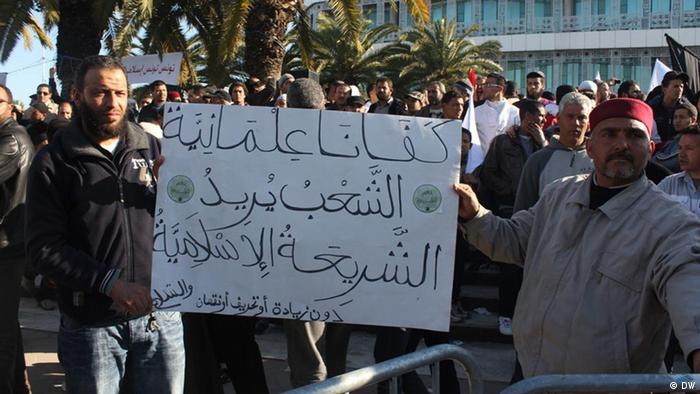 Islamists demonstrated in Tunis for Sharia law
Islamists demonstrated in Tunis for Sharia law
Whenever Islamists enter government, it's not always an immediate
indication that they are going to be against women's rights or human
rights in general. It's always dependent on the political will of
whoever happens to be in power. They can base their approach on Sharia
law but at the same time be progressive through a dynamic interpretation
of Islamic legal sources and authorize reforms within the framework of
Sharia.
But of course it all depends on who's carrying out these interpretations, doesn't it?
Absolutely. That's exactly where the danger lies. And that's certainly also the reason why people are scared of it. There is no certified security for minorities, women and the weaker members of society. These are more or less dependent on the good will of legal scholars. If the scholars are well disposed to these individuals, then the group concerned will fare well. But if they are not, the disadvantaged have no legal means at their disposal to take action. There is a lack of objectivity, practicality and security for the citizen. He must be able to rely on his rights being guaranteed and respected.
After the revolution in Tunisia, debate raged over the secular character of the new constitution. Where is this debate heading?
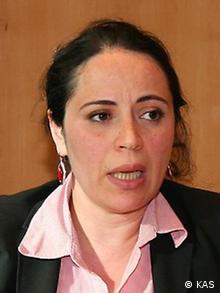 Gallala-Arndt currently researches family and succession law in Islamic countries
The debate over Sharia as legislative resource was triggered when
Ennahda accepted that this is not enshrined in the constitution as such.
This means that Article 1 of the constitution in its current form stays
as it is. This purely states that Islam is the religion of the state.
So Sharia is not actually mentioned in the Tunisian constitution.
Gallala-Arndt currently researches family and succession law in Islamic countries
The debate over Sharia as legislative resource was triggered when
Ennahda accepted that this is not enshrined in the constitution as such.
This means that Article 1 of the constitution in its current form stays
as it is. This purely states that Islam is the religion of the state.
So Sharia is not actually mentioned in the Tunisian constitution.
Unlike Tunisia, Libya does not have a reference framework for the drawing up of a constitution. Political parties and NGOs are virtually non-existent. Can Tunisia serve as a model here?
Yes it can. One example of this is how electoral lists are drawn up. Regulations stipulate a strict parity of the sexes: man, woman, man, woman. The Libyans adopted this concept from the Tunisians. As a neighboring country, Tunisia can certainly serve as a model.
But one must also consider the special qualities of Libyan society. This is a society that as a result of Moammar Gadhafi's reign of terror suffers from an acute lack of institutions as well any kind of culture of political debate. But there's also a highly educated youth and an elite that wants this to change. That's why I'm quite confident about Libya.
In Egypt Nobel Peace laureate Mohammed ElBaradei is calling for the new constitution to be based on German basic law, in particular with regard to the anchoring of fundamental rights such as freedom of expression and freedom of religion. Is it possible to simply transfer such a model?
I don't believe that in the present situation, fundamental rights such as they exist in Germany will also be anchored in this form in the Egyptian constitution. Whether we want it or not, this will be a constitution with many compromises. Secular forces must also accept that Islamic influence will resound through it. The Muslim Brotherhood has a parliamentary majority, and this is a very religious society.
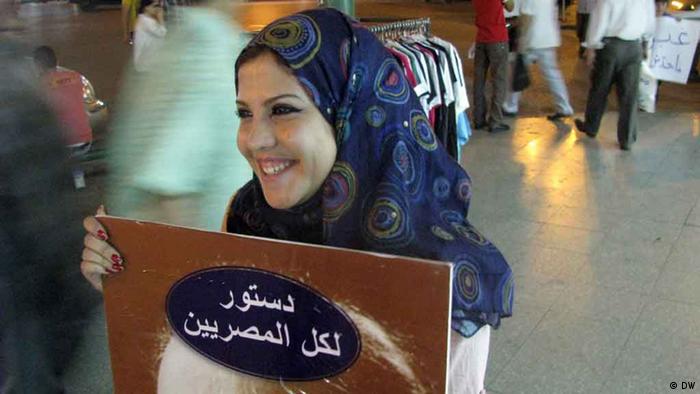 "A constitution for all Egyptians" this protester's sign reads
"A constitution for all Egyptians" this protester's sign reads
What dangers does the process of democratization present to Arab Spring nations?
The Islamists can be democratic. But as far as I see it, there is a danger that once they are in power, they could move to restrict human rights or women's rights in particular. But nevertheless I'm not assuming that this will become an urgent problem at the present time. The current situation in Tunisia and also in Egypt is so complicated that there's a great need for consensus solutions. Political actors must first address economic problems and to this end, are forced to make compromises.
I think that even though the situation for religious minorities and women may not improve, at least it won't get any worse. Consensus is also sought on these issues. We'll just have to wait and see whether or not Arab Islamists can behave in a democratic fashion, also within their own parties.
Interview: Annett Hellwig, Qantara.de
Editors: Arian Fariborz / Lewis Gropp, Qantara.de, Sabina Casagrande / Rob Mudge
Catitan Sut:
Artikel pertama mempamir bagaimana kuasa-kuasa barat menilai ekonomi Turki. Peningkatan dalam pencapaian ekonomi Turki adalah sesuatu yang membanggakan. Ianya berlaku ketika parti pro Islam mentadbir Turki. Mereka, kuasa-kuasa barat, sudah tentu agak rimas untuk mengaku yang di waktu sama sebahagian negara-negara di Eropah menghadapi krisis ekonomi, sehingga keadaan matawang Euro menjadi goyah.
Maka untuk mereka 'justify' perkembangan ekonomi Turki yang memberangsangkan itu, memang mereka mempunyai hujjah untuk mengatakan perkembangan ekonomi negara itu adalah relatif; maksudnya Turki ketinggalan jauh dalam perkembangan ekonomi secara perbandingan dengan negara2 lain di Eropah. Walaupun ekonominya berkembang pesat, tetapi masih jauh ketinggalan. Yang agak sinisnya mereka bandingkan perkembangan ekonomi Turki dengan cerita katak yang cuba berusaha untuk mengembongkan tubuhnya untuk menyaingi tubuh lembu, akibatnya tubuhnya pecah meletup...
Bagaimanapun sekiranya Turki terus berjaya mengekalkan daya-saingnya pada landasan yang sesuai dengan citarasa rakyatnya, sudah tentu dalam yang singkat mereka akan muncul sebagai kuasa politik dan ekonomi dunia yang dihormati. Umpama Korea Selatan, yang membangun pesat dalam jangka masa beberapa puluh tahun sahaja.
Artikel kedua mempamirkan bagaimana sebuah negara yang semakin terpinggir popularitinya di kalangan ummah, Iran, yang cuba meletakkan dirinya di atas pentas bersama-sama pimpinan baru Masir yang kini menjadi inspirasi kepada sekian banyak orang muda di negara2 ummah Islam.
Model Revolusi Iran semakin dilupai. Revolusi itu sendiri tidak membangkitkan nostalgia yang menghairahkan di kalangan orang kebanyakan, kecuali mereka yang meminati ajaran Syiah. Penglibatan Iran secara terang-terangan di Syria, walaupun di atas apa dalih yang diberi sekalipun telah menyebabkan rasa tidak senang-hati terhadp Iran di kalangan ummah semakin ketara.
Menyedari Iran telah semakin terpinggir, mungkinnya keluarlah berita dari Iran yang mendakwa Presiden Mursi akan menjalin hubungan yang lebih akrab dengan Iran, walaupun Mursi sendiri menafikan pernah mengadakan temu-bual dengan wakil berita Iran.
Artikel ketiga tentang prospek demokrasi di kalangan Islamists. Sekarang ini bukan sahaja proses demokrasi adalah syarat wajib untuk mana-mana negara untuk diterima baik oleh masyarakat madani (civil society ) sedunia, bahkan ideals demokrasi itu telah dianggap sebagai sesuatu yang suci dan untouchable .
Kebimbangan mereka yang Islamists sekadar menggunakan instrument demokrasi untuk mempromosikan agenda mereka sendiri. Tetapi mereka juga sedar yang mereka mahukan Islamists bergiat dalam linkungan demokrasi , jangan biarkan mereka terkeluar daripada garis lingkungan ini, supaya mereka dapat mem-predict their next move. Mereka mahu Islamists merasai mereka bebas bergiat dalam lingkaran demokrasi, tetapi kebebasan mereka adalah umpama kebebasan ikan-ikan berenang dalam aquarium yang trasparent. Walau segalak mana ikan itu beraksi pun, sebenarnya ianya beraksi dalam terang dan ruang yang terkawal...
DW: The moderate Islamist party Ennahda emerged as the clear victors in elections to the Constituent Assembly in Tunisia last year. How do you assess their policies to date?
Imen Gallala-Arndt: Initially, Ennahda's statements were the source of great confusion, because some of them were threatening in tone and party leaders were saying things that contradicted statements issued by other members. This was deeply unsettling for the people of Tunisia as well as for other political figures. For example Sadok Chourou, one of the hardliners within the Ennahda movement in the constituent assembly, criticized individuals who had demonstrated against the government, and underpinned his attack with a verse out of the Koran. He described the demonstrators as godless, and said they were destined for hell. It is of course unnerving when religious arguments are used to describe political opponents as infidels.
Ennahda also initially insisted that Sharia must be the source of legislation, although it later revised this statement. But these are exactly the kind of views that unsettle the population and mean that it's difficult to gauge what the party stands for. It does of course represent certain principles. But now that it has assumed governmental responsibility, it must learn to be pragmatic. Ennahda still lacks a clear line in this respect.
Western discourse often views Sharia as incompatible with constitutional principles. What about the compatibility of Sharia and human rights in Arab nations currently undergoing upheaval?
One must bear in mind that Sharia was developed over the course of history by legal scholars taking local social and economic conditions at the time into consideration. There's a difference between that which is viewed as a principle and as an eternal truth in Islamic law, and the sections of the Sharia code that are currently undergoing reappraisal. Polygamy was abolished in Tunisia in 1956, but at the time no one claimed that this represented a break with Sharia. Quite on the contrary: lawmakers invoked the principles of Islamic law with the intention of acting in the interests of progress.
It was recognized that the social position of women had changed and that it was in the interests of women as well as of the entire family to adapt the legal position of women in a consistent manner.
 Islamists demonstrated in Tunis for Sharia law
Islamists demonstrated in Tunis for Sharia lawBut of course it all depends on who's carrying out these interpretations, doesn't it?
Absolutely. That's exactly where the danger lies. And that's certainly also the reason why people are scared of it. There is no certified security for minorities, women and the weaker members of society. These are more or less dependent on the good will of legal scholars. If the scholars are well disposed to these individuals, then the group concerned will fare well. But if they are not, the disadvantaged have no legal means at their disposal to take action. There is a lack of objectivity, practicality and security for the citizen. He must be able to rely on his rights being guaranteed and respected.
After the revolution in Tunisia, debate raged over the secular character of the new constitution. Where is this debate heading?
 Gallala-Arndt currently researches family and succession law in Islamic countries
Gallala-Arndt currently researches family and succession law in Islamic countriesUnlike Tunisia, Libya does not have a reference framework for the drawing up of a constitution. Political parties and NGOs are virtually non-existent. Can Tunisia serve as a model here?
Yes it can. One example of this is how electoral lists are drawn up. Regulations stipulate a strict parity of the sexes: man, woman, man, woman. The Libyans adopted this concept from the Tunisians. As a neighboring country, Tunisia can certainly serve as a model.
But one must also consider the special qualities of Libyan society. This is a society that as a result of Moammar Gadhafi's reign of terror suffers from an acute lack of institutions as well any kind of culture of political debate. But there's also a highly educated youth and an elite that wants this to change. That's why I'm quite confident about Libya.
In Egypt Nobel Peace laureate Mohammed ElBaradei is calling for the new constitution to be based on German basic law, in particular with regard to the anchoring of fundamental rights such as freedom of expression and freedom of religion. Is it possible to simply transfer such a model?
I don't believe that in the present situation, fundamental rights such as they exist in Germany will also be anchored in this form in the Egyptian constitution. Whether we want it or not, this will be a constitution with many compromises. Secular forces must also accept that Islamic influence will resound through it. The Muslim Brotherhood has a parliamentary majority, and this is a very religious society.
 "A constitution for all Egyptians" this protester's sign reads
"A constitution for all Egyptians" this protester's sign readsThe Islamists can be democratic. But as far as I see it, there is a danger that once they are in power, they could move to restrict human rights or women's rights in particular. But nevertheless I'm not assuming that this will become an urgent problem at the present time. The current situation in Tunisia and also in Egypt is so complicated that there's a great need for consensus solutions. Political actors must first address economic problems and to this end, are forced to make compromises.
I think that even though the situation for religious minorities and women may not improve, at least it won't get any worse. Consensus is also sought on these issues. We'll just have to wait and see whether or not Arab Islamists can behave in a democratic fashion, also within their own parties.
Interview: Annett Hellwig, Qantara.de
Editors: Arian Fariborz / Lewis Gropp, Qantara.de, Sabina Casagrande / Rob Mudge
Catitan Sut:
Artikel pertama mempamir bagaimana kuasa-kuasa barat menilai ekonomi Turki. Peningkatan dalam pencapaian ekonomi Turki adalah sesuatu yang membanggakan. Ianya berlaku ketika parti pro Islam mentadbir Turki. Mereka, kuasa-kuasa barat, sudah tentu agak rimas untuk mengaku yang di waktu sama sebahagian negara-negara di Eropah menghadapi krisis ekonomi, sehingga keadaan matawang Euro menjadi goyah.
Maka untuk mereka 'justify' perkembangan ekonomi Turki yang memberangsangkan itu, memang mereka mempunyai hujjah untuk mengatakan perkembangan ekonomi negara itu adalah relatif; maksudnya Turki ketinggalan jauh dalam perkembangan ekonomi secara perbandingan dengan negara2 lain di Eropah. Walaupun ekonominya berkembang pesat, tetapi masih jauh ketinggalan. Yang agak sinisnya mereka bandingkan perkembangan ekonomi Turki dengan cerita katak yang cuba berusaha untuk mengembongkan tubuhnya untuk menyaingi tubuh lembu, akibatnya tubuhnya pecah meletup...
Bagaimanapun sekiranya Turki terus berjaya mengekalkan daya-saingnya pada landasan yang sesuai dengan citarasa rakyatnya, sudah tentu dalam yang singkat mereka akan muncul sebagai kuasa politik dan ekonomi dunia yang dihormati. Umpama Korea Selatan, yang membangun pesat dalam jangka masa beberapa puluh tahun sahaja.
Artikel kedua mempamirkan bagaimana sebuah negara yang semakin terpinggir popularitinya di kalangan ummah, Iran, yang cuba meletakkan dirinya di atas pentas bersama-sama pimpinan baru Masir yang kini menjadi inspirasi kepada sekian banyak orang muda di negara2 ummah Islam.
Model Revolusi Iran semakin dilupai. Revolusi itu sendiri tidak membangkitkan nostalgia yang menghairahkan di kalangan orang kebanyakan, kecuali mereka yang meminati ajaran Syiah. Penglibatan Iran secara terang-terangan di Syria, walaupun di atas apa dalih yang diberi sekalipun telah menyebabkan rasa tidak senang-hati terhadp Iran di kalangan ummah semakin ketara.
Menyedari Iran telah semakin terpinggir, mungkinnya keluarlah berita dari Iran yang mendakwa Presiden Mursi akan menjalin hubungan yang lebih akrab dengan Iran, walaupun Mursi sendiri menafikan pernah mengadakan temu-bual dengan wakil berita Iran.
Artikel ketiga tentang prospek demokrasi di kalangan Islamists. Sekarang ini bukan sahaja proses demokrasi adalah syarat wajib untuk mana-mana negara untuk diterima baik oleh masyarakat madani (civil society ) sedunia, bahkan ideals demokrasi itu telah dianggap sebagai sesuatu yang suci dan untouchable .
Kebimbangan mereka yang Islamists sekadar menggunakan instrument demokrasi untuk mempromosikan agenda mereka sendiri. Tetapi mereka juga sedar yang mereka mahukan Islamists bergiat dalam linkungan demokrasi , jangan biarkan mereka terkeluar daripada garis lingkungan ini, supaya mereka dapat mem-predict their next move. Mereka mahu Islamists merasai mereka bebas bergiat dalam lingkaran demokrasi, tetapi kebebasan mereka adalah umpama kebebasan ikan-ikan berenang dalam aquarium yang trasparent. Walau segalak mana ikan itu beraksi pun, sebenarnya ianya beraksi dalam terang dan ruang yang terkawal...
No comments:
Post a Comment